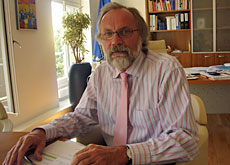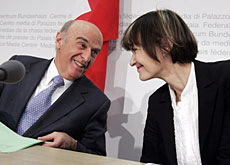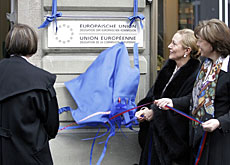Brussels’ man in Bern takes stock

Michael Reiterer, Europe's first-ever ambassador to Switzerland, tells swissinfo about his impressions of Bern-Brussels relations after six months in the job.
The Austrian, whose official title is European Commission head of delegation to Switzerland, says he misses a fundamental debate on Swiss-European Union relations. He is also following upcoming elections with interest.
swissinfo: How would you describe your first few months in your new position?
Michael Reiterer: I was amazed by the huge interest in me at the beginning – which still continues today. This is probably because people are catching up in terms of information.
It’s not only important to speak to politicians and officials, but also to the ordinary Swiss person in the street – who might be either for or against the EU. This gives a good balance and allows me to carry out my role as mediator between Brussels and Bern better.
swissinfo: Where do you see Switzerland in ten years time?
M.R.: There’s little chance of Switzerland becoming an EU member in the near future. What I miss is a fundamental debate over Swiss-EU relations, such as how does Switzerland imagine its position in the next decade outside the EU? What are its strategic goals for Europe? And how does it intend to achieve them?
I can discuss technical matters with politicians or officials, but this overview is still lacking.
I have given many speeches about bilateralism – Switzerland’s preferred approach to the EU. Bilateralism is, of course, rather difficult. It consists of more than 100 agreements which are not very dynamic. They must be constantly adapted – something that is extremely time-consuming. This path has definite consequences and you have to accept the disadvantages.
swissinfo: Will the bilateral approach be exhausted soon?
M.R.: At some point the limits of the bilateral path will be reached, but not in the short term. It only works when the interests of both parties are the same.
I know Switzerland would be interested in a regular political dialogue, in addition to the economic one. But the bilateral approach does not allow for that.
swissinfo: How would you describe the current political atmosphere in Switzerland in the middle of the election campaign?
M.R.: The EU is not an election topic, which is good. There is one party, however, that has made it its goal to stop Switzerland joining the EU. There are other parties which are either very positive or have an ambivalent attitude towards the EU. It seems to me that this pretty much reflects the atmosphere in the country.
My feeling is that that there is a solid majority against joining the EU. But that doesn’t mean that most Swiss are against the EU as such. I am convinced that the EU’s achievements of the last decades are judged positively and are recognised by a majority of people here. This can be inferred from the last three referendums on Europe, which have all had positive results.
swissinfo: The current election campaign has been tougher than ever. What’s your view on it?
M.R.: There are a few worrying elements. But these have already been taken up on an international level. I am aware that in other countries election campaigns have also been pinned on foreigners.
What’s interesting – and this is something that is particular to Switzerland – is that ministers are expected to keep a low profile. But this applies less and less now. In other countries party leaders always come out and put themselves forward as heads of government or ministers should their party win.
In the past people tried to make an artificial divide between the [four-party consensus-based] government and the parties in Switzerland. Now it’s becoming clear that the political system is changing – and that now even ministers are intervening in the election campaign.
I take this as a step towards a normal state of affairs, rather than the other way around. It also brings a bit of excitement into the electoral run-up.
swissinfo: How strong is the relationship between the EU and Switzerland – especially in relation to the tax row?
M.R.: There is no tax row, but a “financial assistance” discussion. This shows the limits of the bilateral approach. As Switzerland is not an EU or an European Economic Area member, we have to work this out on non-member terms as we have no common court of law. This means sitting down together and talking.
Switzerland shares the same cultural background as Europe and I always try to point this out to avoid any wrong interpretations. People are always quick to see an economic problem as a crisis in EU-Swiss relations.
As we have such intensive contacts, we should really make an effort to discuss disputes whenever they arise, without necessarily looking at the election calendar.
swissinfo, based on an interview in German by Gaby Ochsenbein
The 53-year-old Austrian from Innsbruck is the first-ever EU ambassador to Bern.
The “EU embassy” officially opened in the Swiss capital on April 3, 2007.
Reiterer served as deputy head of the delegation of the European Commission to Japan for four years.
Since 2005, as well his diplomatic activities, he has been a lecturer on international relations at Innsbruck University.
Reiterer is the author of two books on relations between Asia and Europe and on asylum law.
He is married and has a daughter.
Switzerland’s competitive tax system has come under scrutiny from the EU, which maintains tax breaks attracting foreign companies contravene the 1972 Free Trade Agreement between Bern and Brussels.
The main bone of contention is that cantons give foreign firms with holding companies based in Switzerland preferential tax privileges by exempting tax on profits generated outside the country. The EU has called on Switzerland to give up the tax practice and adapt to its demands.
Switzerland has so far refused, pointing out that the same tax breaks also apply to many domestic companies and that it has not signed up to the EU’s tax code of conduct. It also says the Free Trade Agreement does not apply to taxation issues.

In compliance with the JTI standards
More: SWI swissinfo.ch certified by the Journalism Trust Initiative













You can find an overview of ongoing debates with our journalists here . Please join us!
If you want to start a conversation about a topic raised in this article or want to report factual errors, email us at english@swissinfo.ch.